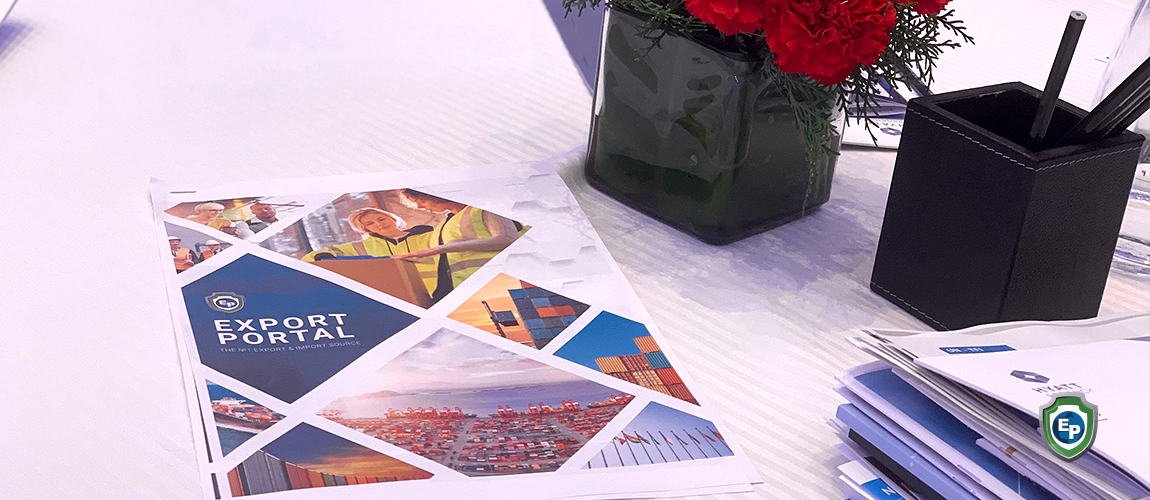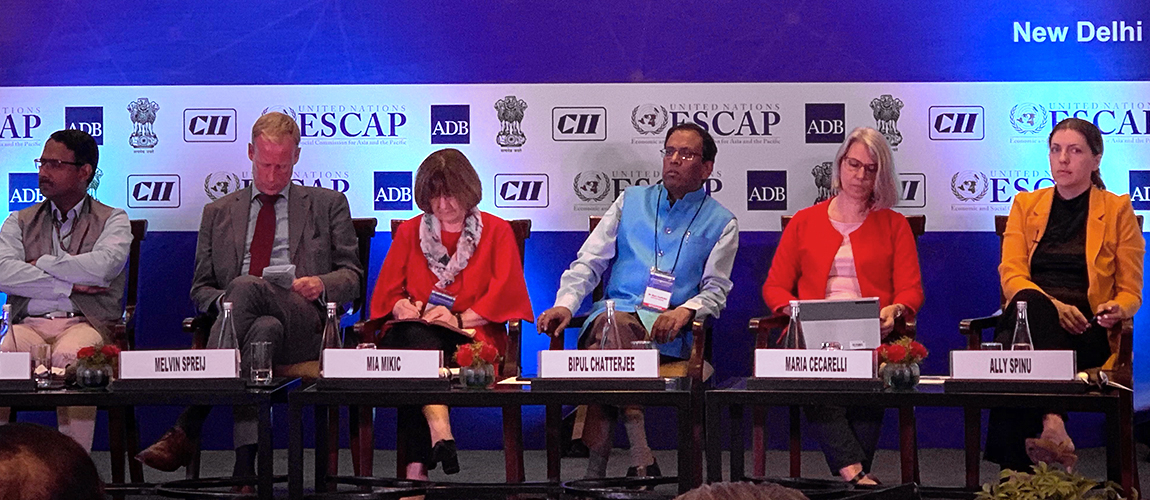Day Two at the Asia-Pacific Trade Facilitation Forum
Ally Spinu, CEO of Export Portal, attended The Asia-Pacific Trade Facilitation Forum and spoke at one of the forums. Learn about the sessions and takeaways from this forum – read more here!

The second day of the Asia-Pacific Trade Facilitation Forum (APTFF) began with a session titled “Aligning trade facilitation with sustainable development goals: Good Practices in trade facilitation for SMEs, agriculture, and women.”
Mr. Melvin Spreji, head of Standards and Trade Development Facility Secretariat, opened the session talking about the Food industry and how fast the demand of food export is growing and how time is so contingent to the quality of this product when it passes the border. He spoke about the need for spending time on inspections but not jeopardizing the quality of food that crosses borders. He also spoke about a pilot program his organization, the International Plant Protection Convention (IPPC) works on, called ePhyto.
An ePhyto is an electronic version of the phytosanitary certificate in an XML format. ePhytos are easier for countries (especially those with limited resources) to transmit for their exported goods and to receive for imported goods. This facilitates the trade of plants and plant products and improves access to food. The solution being developed by IPPC is intended to be compatible with existing border information management systems, and it is expected to build upon such systems where possible.
New systems like this, like Export Portal, are incredibly necessary to make trade both easier and more accessible.
Digitizing, eCommerce, and Women-Run Businesses
At the same session, Mrs. Maria Cacareli discussed digitization and eCommerce, making it easier for women to enter the market. Online business, in general, helps women because they can avoid the discrimination that many women in developing countries still meet when conducting business with men.
In the Asia Pacific, the share of female internet access was 39.1 percent in 2017, compared to 47.9 of men. On top of that, only 38 percent of women have adopted smartphones in India, compared to 71 percent of men. By emphasizing easy-to-use online platforms like Export Portal, more women could enter the market and create sustainable businesses.

Digital and Sustainable Trade Facilitation for Regional Prosperity Session
Ally Spinu, CEO of Export Portal, spoke about the challenges we have discovered while integrating SMEs from developing countries into a B2B online trade marketplace. These challenges include a lack of knowledge and education for SMEs, which delays their integration into the digital world.
Spinu also discussed the importance of policymakers to collaborate with comprehensive platforms such as Export Portal. Together, they can help channel trade facilitation and educating the world about international trade. Many government administrations do not know enough about mSMEs – their needs, their challenges, and their support system. They are good at establishing various organizations for mSMEs, but the system is paralyzed due to bottlenecks, slow follow-up, and general bureaucracy. Data is critical for proper and timely decision making. The public sector has to pair up with platforms such as Export Portal to gain access to real data and direct access to mSMEs.
For this reason, Export Portal Invites experts and policymakers from all over the world to adopt an open attitude and collaborate with us in increasing the number of trading mSMES in their countries. Our expert panel, EP+, is a place for our users to have an open conversation with experts, gain knowledge, and help share challenges with the people who can create change.
Spinu closed with the reason why mSMES are essential to each country and economy: although mSMES are eight out of ten companies in each developing countries, they are the people that most likely invest back in their communities. mSMEs expand job opportunities, build infrastructure, and invest in the education of youth.
Facilitating Trade Finance for Inclusive Growth: Building Gaps Through Technology Session
At this session, Mr. David Rasquinha Rasquinha, the Managing Director of EXIM Bank, said that banks as an institution would look for better profit and lower risk. However, this doesn’t always provide SMEs with options. He then encouraged governments to create different programs that incentivize financial institutions to issue credit to mSMEs.
Mrs. Emily Chin, the Chief Product Officer Capital and Credit, discussed the importance of new technology, such as blockchain, that better integrates financial institutions into the supply chain. With the transparency this technology provides, financial institutions and banks can gain the knowledge, trust, and awareness to support the economy better. They are also able to track and secure their visibility on the product that in many cases is the collateral. There was a healthy debate about whether new and emerging technologies will solve the problem in trade finance, accessibility, or if they will develop a new challenge: cost.
There are submarkets and new-age financiers that are targeting SMEs. However, even if they apply, they may not qualify due to their short or non-existing credit, or lack of documents.
Mrs. Urachada Ketprom, Director of Standard Office, Electronic Transaction Development Agency (ETDA) from Thailand, discussed the importance of financial education.
“We need to teach mSMES to build their credit and credit History, Ketprom said. “This is a bigger issue than the availability of funds.”
Trade Facilitation for eCommerce: Emerging Innovations for Seamless Cross-Border Transactions Session
Mr. Ashotush Bajpai, Vice President of DHL, opened this session with the topic of exponential eCommerce growth around the globe. He also discussed the need for each government to create and nourish the ecosystem of handling the current and future volume of transactions that eCommerce generates. Due to this increased volume, DHL is experiencing issues with a lack of personnel and the right technology. This creates delays and negatively influences both buyers and sellers.
The Universal Postal Union (UPU), the union of all postal offices around the globe, has called on government representatives and policymakers to allow for expansion and support handling the volume generated by eCommerce transactions. This directly affects postal offices all over the world, specifically, those that cover more rural areas that would be otherwise be considered unreachable.
Ms. Hong Xue, the Director of Internet Policy and Law (IIPL), discussed the oil of the modern age – data. She also raised the concern of countries not willing to share data for various reasons, such as political. Moreover, if countries are willing to share their data, they don’t have clear documents about the requirements that one must meet for legal data sharing. She proposed that trade facilitation documents must include another chapter for clarifying the data exchange. Despite on-going regional trade agreements and single window data points being developed, if countries will not have a clear protocol about data sharing and data ownership, we will never be able to achieve the desired results.
The moderator of this session, Professor Somuk Keretho, Director of the Institute for Information Technology Innovation, Kasetsart UNIVERSITY IN THAILAND, was kind enough to introduce Ally Spinu and Export Portal from the stage. Spinu explained our innovative way to solve trade challenges within our blockchain-enabled platform.
Export Portal then reminded the audience that our portal’s focus is SMEs, and we use Hyperledger-based blockchain technology to increase the security and transparency of B2B eCommerce transactions. This allows us to minimize fraud and has also significantly lowered the amount of time and the cost of transactions, enabling more SMEs around the globe to enter international trade. After all, the numbers don’t lie: 97 percent of all trade transactions conducted by mSMES were done through eCommerce. We hope that by raising the number of mSMEs and maintaining the same behavior, we will help the number of traded goods within the mSME sector to grow exponentially.
Overall, the panelists of this session discussed that the regulatory instruments of each country must adapt to new technology. They must also create easy-to-follow rules for eCommerce regulation. If the taxations or regulations are too harsh, this will work against the country. Due to new technology and the internet, people will find alternative, illegal ways to transact, which is not beneficial to any stakeholders.
The Importance of eCommerce for Global Trade
UNCTAD states in one of their surveys that 57 percent of entire global trade is conducted via eCommerce, and this number is expected to rise to close to 80 percent in the next few years. Therefore, investing in eCommerce platforms and collaborating on the national level is very crucial for all policymakers and government agencies. This would be the response to the African delegation, which was asking how to minimize frauds, illegal trade, and lack of paid taxes for trade conducted via eCommerce.
The Future of Trade Facilitation on Export Portal
The APTFF was a successful meeting of the minds concerning trade facilitation, and Export Portal is proud to have been part of it. Export Portal’s whole mission is to facilitate trade for people all over the world, so seeing experts gathering to speak specifically on this topic is a significant step forward in creating the world we want to create. If you are interested in being a part of the international trade revolution and facilitation of trade for all, register with Export Portal today.






Comments 0